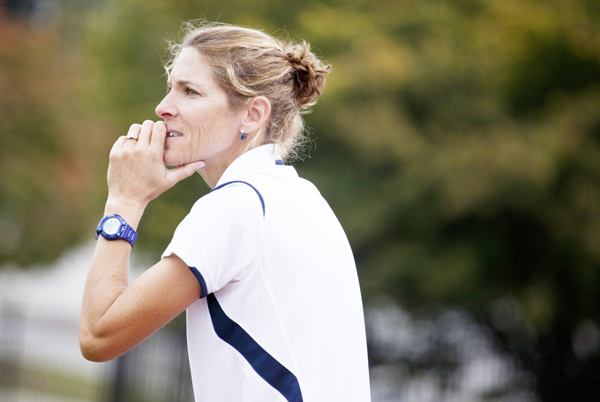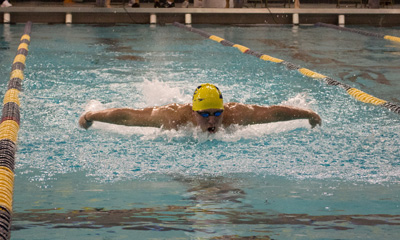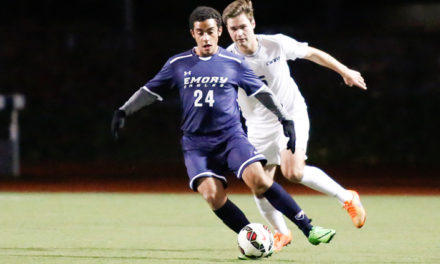On Saturday, the women’s soccer team capped off a magical 2012 season with a berth in the Division III NCAA title game. It was undoubtedly the best season in program history, a fantastic campaign with only two losses and a number-two national ranking.
Not only was the season a huge step forward for the Eagles, it was another impressive development in the career of Head Coach Sue Patberg.
“She has really taken the program to the next level,” Athletic Director Tim Downes said.
Patberg’s path to Emory was equally remarkable. She spent 12 years coaching at the Division I level at the University of Minnesota and University of Georgia before being appointed head coach at Emory in 2005, compiling eight NCAA tournament appearances along with a record of 146-88-18.
“I was ready for something totally different,” Patberg said. “When you’re coaching in the Big Ten and SEC, you’re relying on 18- and 20-year-olds to keep your job.”
Emory, however, provided a whole new set of challenges.
“I knew when I was first walking down the halls [of the Woodruff P.E. Center] and saw all those banners that this was a place we could win a national championship,” she said. “Not all schools are created equally … but why can’t we?”
The Eagles have gotten a little bit closer in each year of Patberg’s career in blue and gold. The team has gone 110-24-25 in the coach’s eight seasons, notching six NCAA Tournament appearances and a pair of University Athletic Association (UAA) titles.
Emory has made serious title runs in each of the last three seasons, reaching the Elite Eight in 2010, the Sweet Sixteen in 2011 and coming a 1-0 loss to Messiah College (Penn.) away from a national championship this season.
Even with her tremendous track record, the 2012 season was a completely new experience. Patberg cited the team’s perseverance and determination as key in their title run, as the Eagles battled seven different teams to ties and were defeated just twice on the year – and only once in the regular season.
“They just never gave up,” Patberg said. “They are fighters. All those challenges along the way prepared us for playing on the road all the way through the NCAA Tournament.”
The Eagles excelled in the tournament. They breezed through first three rounds, outscoring their opponents 6-1, before a dramatic win on a 13-round shootout in the quarterfinals against UAA rival Carnegie Mellon University. That put the team into the Elite Eight, where they faced some familiar company.
“We looked at the teams with us in the Elite Eight and thought, ‘Hey, we’ve played six of these teams already,” Patberg said. “That’s when we realized that we could do it.”
A 2-1 win over Wheaton College (Ill.) put the Eagles into the championship, where their run ended against Messiah. They finished the season as the second-ranked team in nation and a 15-2-7 record.
Patberg’s true impact at Emory, however, cannot be measured in wins and losses.
“Coach Patberg has brought a hard-working, determined attitude that has translated to the rest of the team,” senior goalkeeper Kaele Laeonard said. “The most important thing I have learned from her is that you need to give everything you have for your team in order to be successful.”
As for future seasons, Patberg believes the Eagles can make it over the hump and bring home a title. Still, she says, there are more pressing issues than a national ranking.
“The number one thing for me is … I want our student-athletes to look back and say, ‘That was the best decision I ever made,'” Patberg said. “Second, I want our program to win a national championship.”
The Eagles, in their entire history, have never yet been closer than they are under her guidance.
– By Ryan Smith
The Emory Wheel was founded in 1919 and is currently the only independent, student-run newspaper of Emory University. The Wheel publishes weekly on Wednesdays during the academic year, except during University holidays and scheduled publication intermissions.
The Wheel is financially and editorially independent from the University. All of its content is generated by the Wheel’s more than 100 student staff members and contributing writers, and its printing costs are covered by profits from self-generated advertising sales.







Coach Patberg brings a D1 competitiveness to Emory while maintaining the highest academic standards. Emory is fortunate to have her leading and attracting such high quality student athletes.